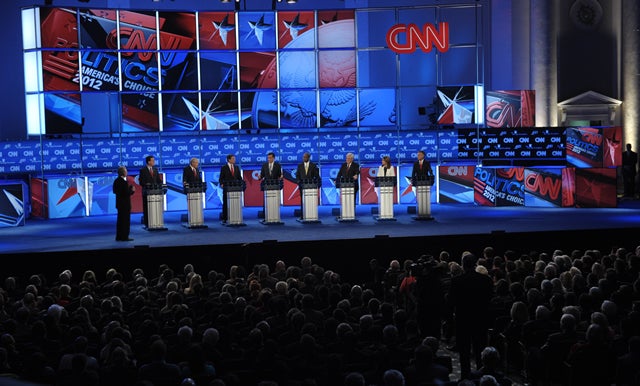They came, they saw, and they debated. Last night in Washington, D.C.’s, Constitution Hall, eight Republican contenders for the presidency engaged in a debate on foreign policy and national security co-hosted by The Heritage Foundation, the American Enterprise Institute, and CNN. When the dust had settled after the two-hour debate, Americans had a clearer picture of where each of the candidates stood on the seminal issue of how to best protect America.
The candidates addressed questions ranging from Afghanistan to Pakistan, Africa to South America, and border security to terrorism. Critically, the candidates confronted the challenge of defense spending and whether our military has the funding it needs to carry out its mission. Heritage’s James Carafano says that it’s an issue that can’t be ignored:
Regardless of what the candidates said tonight, the reality is that if one of them takes office, he or she will be commander in chief of a military that is under-funded and under-powered. President Obama has already put enough cuts on the table to leave the military smaller and less capable than when he took office.
Changing the trajectory of the U.S. military will require investing in the military and dealing with our fiscal crisis. This debate gave each candidate an opportunity to make a case for being up to the job.
The growing threat posed by Iran’s accelerating nuclear weapons program and support for terrorism surfaced as an issue at the top of nearly all the candidates’ concerns, though they disagreed on how to best confront the problem. Among the problems they identified were Iran’s growing ties with Venezuela and support for Hezbollah activity in Latin America, the need for increased sanctions, and President Obama’s lack of leadership on the issue.
Border security and immigration, too, were hot topics, as was the growing threat of expanding socialism in South America, the relationship between Venezuelan President Hugo Chavez and Iranian leader Mahmoud Ahmadinejad, as well as the ever-present menace of Mexican criminal cartels.
For all the ground that was covered, unfortunately there was not enough time to discuss every issue of importance. Take Asia, for example, and concerns such as Chinese currency and exchange rate policies, the growing assertiveness of Chinese foreign policy toward its neighbors, and the impact of budget cuts on the U.S. military posture in Asia. North Korea, too, went unaddressed last night. Heritage’s Bruce Klingner says it should be a priority:
North Korea already has six to eight nuclear weapons and 1,000 missiles that threaten South Korea, Japan, and U.S bases in Okinawa and Guam. Secretary of Defense Robert Gates warned in January 2011 that North Korea could hit the United States with a nuclear weapon by 2015.
It would be worthwhile to discern whether the Republican candidates have a plan for dealing with Pyongyang before one of them potentially becomes commander in chief.
There are other issues, too, that the presidential candidates should address, including how America maintains its enduring alliances in Europe, the expansion of free trade, and the maintenance of an effective missile defense system.
One thing is clear from last night’s debate: the United States faces significant foreign policy and national security challenges, and even more attention should be focused on these issues in the 2012 presidential campaign. Heritage is proud to have had the opportunity to join with AEI and CNN in bringing these issues to light and fostering a thoughtful debate among the Republican candidates. Protecting our nation and amplifying American leadership globally is a critical issue — one that is fundamental to the role of the President and the federal government. Hopefully the debate continues.
Quick Hits:
- Following the failure of the “super committee,” Senate Democrats are seeking to take up legislation that would add more than $400 billion to the deficit.
- Yemeni President Ali Abdullah Saleh, who has been in power since 1978, will step down following nearly a year of protests and a government crackdown that left hundreds dead and thousands injured.
- Republican Members of Congress are trying to withhold $3.3 billion in federal grants from California’s proposed $98.5 billion bullet train. The project has drawn increasing criticism for its spiraling costs.
- Tens of thousands of protesters gathered in Tahrir Square in Cairo, Egypt, for a fifth day of protests, demanding that the country’s top general step down.
- Taxpayers will likely shell out another $14.3 million in federal aid to the 1,100 people formerly employed by defunct solar company Solyndra. Read more at Foundry.org.



























